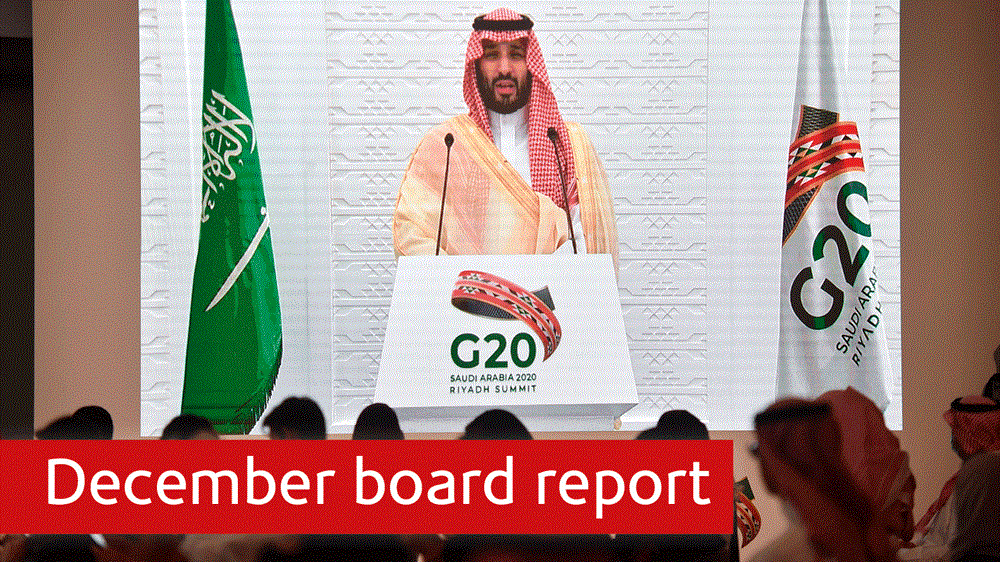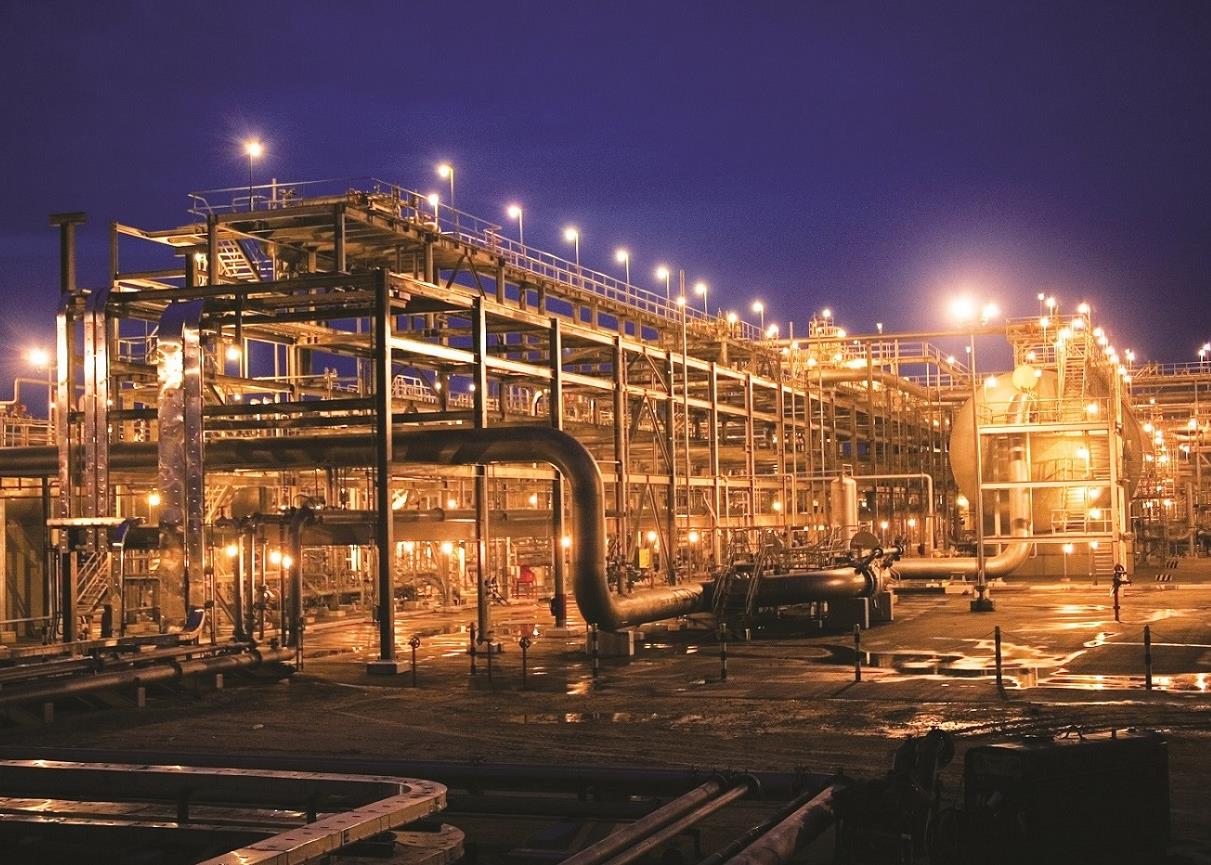

ECONOMY
Riyadh pushes G20 to endorse circular carbon economy
Saudi Arabia has successfully encouraged world leaders attending the G20 Riyadh Summit to endorse the circular carbon economy (CCE) and its four Rs framework of reduce, reuse, recycle and remove.
Riyadh intends to lead the CCE efforts with its own domestic initiatives and has invited other countries to participate.
Saudi Arabia was championing the CCE before it assumed the G20 presidency for 2020 and, in October last year, it announced a carbon trading scheme in line with its goal of diversifying its energy supplies and reducing carbon emissions.
OIL
 Opec+ meets to review outlook and plans for 2021
Opec+ meets to review outlook and plans for 2021
Opec and its allies led by Russia held meetings in November to review plans for the oil market in 2021.
The Opec+ alliance initially planned to raise output by 2 million barrels a day (b/d) in January as part of a wider plan to ease record supply cuts rolled out in 2020.
Opec+ is now considering delaying the increase or further reducing production. One option that is understood to be gaining traction is to retain the existing cuts of 7.7 million b/d for an additional three to six months, instead of altering the reduction to 5.7 million b/d from January.
IRAQ
Border with Saudi Arabia reopens after 30 years
Iraq and Saudi Arabia have opened the Arar border crossing to goods and people after 30 years.
The border was closed after the kingdom severed ties with Iraq following Saddam Hussein’s invasion of Kuwait in 1990.
Relations started to thaw in February 2017 after then Saudi foreign minister Adel al-Jubeir travelled to Baghdad. In October that year, state-backed Saudi Arabian Airlines launched its first flight to Baghdad since 1990.
Plans to reopen Arar are understood to have been under discussion since flights resumed. Iraqi Prime Minister Mustafa al-Kadhimi has made efforts this year to build closer ties with the kingdom.
BAHRAIN
Manama strengthens regional relationships
Bahrain and Israel agreed in November to open mutual embassies and start commercial flights after agreeing to normalise relations during talks in Tel Aviv in September. The trip, recognised as Bahrain’s first official visit to Israel, saw Foreign Minister Abdullatif bin Rashid al-Zayani hold trilateral talks with Israeli Prime Minister Benjamin Netanyahu and outgoing US Secretary of State Mike Pompeo.
The visit coincided with a tripartite summit in the UAE capital that was attended by King Hamad bin Isa al-Khalifa of Bahrain, King Abdullah II of Jordan and Sheikh Mohammed bin Zayed al-Nahyan, Crown Prince of Abu Dhabi and Deputy Supreme Commander of the UAE Armed Forces.
Bahrain’s Crown Prince and Prime Minister Prince Salman bin Hamad al-Khalifa also attended the summit, where cooperation in the health and food security sectors, the socioeconomic response to Covid-19, and the need to pursue a two-state solution for the Palestinian cause were discussed.
UAE
Central bank extends pandemic stimulus package
The Central Bank of the UAE has extended its economic stimulus package until the end of the first half of next year.
 The applicability period of the key components of the Targeted Economic Support Scheme (Tess) will now run until 30 June 2021.
The applicability period of the key components of the Targeted Economic Support Scheme (Tess) will now run until 30 June 2021.
The AED100bn ($27bn) Tess programme was launched in March 2020 in response to the Covid-19 pandemic.
The Tess loan deferral programme is understood to have benefited 310,000 retail customers, 10,000 small and medium-sized enterprises, and 1,500 private sector companies.
“We believe that this initiative will shield the economy from the impact of the pandemic and place us in an ideal position to
recover, once the pandemic is over,” said governor of the UAE Central Bank, Abdulhamid Saeed Alahmadi.
SAUDI ARABIA
 Saudi Aramco returns to international debt markets
Saudi Aramco returns to international debt markets
Saudi Aramco started issuing international bonds in November as part of its global medium-term note programme.
The bonds are senior, US dollar-denominated and unsecured by assets. Net proceeds will be used by the oil company for general corporate purposes.
Citi, Goldman Sachs International, HSBC, JP Morgan, Morgan Stanley and NCB Capital are underwriters for the transaction.
Aramco’s issuance followed its announcement of a third-quarter net profit of $11.8bn.
The amount was 44.5 per cent lower than corresponding figures for 2019, but 80 per cent higher than the net profit worth $6.6bn that Aramco reported for the second quarter of 2020.
MOROCCO
 Western Sahara armed conflict is renewed
Western Sahara armed conflict is renewed
Leaders of the Polisario Front militia group declared war on Morocco in November, ending a three-decade truce over the disputed desert territory in the Western Sahara in north Africa.
The Polisario blocked a border crossing between Morocco and Mauritania in the UN-monitored Guerguerat buffer zone in September.
Polisario secretary-general, Ibrahim Ghali, announced the “resumption of armed struggle” after Morocco launched a military operation in Guerguerat, citing “provocations”.
The GCC has expressed support for Morocco’s intervention to end the blockade.
LEBANON
Political leader hit with new US sanctions
Gibran Bassil, who heads the Free Patriotic Movement party in Lebanon, is subject to fresh sanctions by the US.
Outgoing state secretary Mike Pompeo has accused Bassil of being “notorious for corruption” and linked to “the purchase of influence” within political circles.
While he was energy minister, “Bassil was involved in approving several projects that would have steered Lebanese government funds to individuals close to him, through a group of front companies,” Pompeo said.
Bassil’s assets in the US have been frozen and he is barred from entering the country.
EAST MEDITERRANEAN
Lebanon and Israel border talks continue
A third round of border talks mediated by the US and the UN concluded between Israel and Lebanon in mid-November.
 The demarcation discussions about the disputed area in the eastern Mediterranean focused on the Lebanese delegation’s push for an additional 1,430 square metres to be included in its territory.
The demarcation discussions about the disputed area in the eastern Mediterranean focused on the Lebanese delegation’s push for an additional 1,430 square metres to be included in its territory.
Beirut and Tel Aviv, which are still technically at war and do not share diplomatic ties, agreed in October to hold negotiations over the dispute, now in its 30th year. Tel Aviv said in a Hebrew-language statement at the time that its goal was “to end the dispute over the demarcation” and “help develop natural resources to benefit [all parties]”.
Washington has described the latest round of talks as a “historic” undertaking.
A settlement of the maritime dispute could boost offshore prospects for Beirut, which is facing its worst economic crisis since the 1975 civil war, and would also improve Israel’s national security position.
FURTHER READING
> Saudi Arabia greenlights major school-building scheme
Saudi Arabia’s Taweer Building Company signed a contract for the financing, design and construction of 60 schools in Mecca and Jeddah with Ajyad Knowledge Company for Education & Training and local construction firm Al-Bawani. The scheme is the first phase of the kingdom's public-private partnership schools project.
> Emirates president Tim Clark reaffirms airline’s A380 model
The airline’s fleet of Airbus A380 jumbo jets are expected to remain popular with travellers despite doubts about the aircraft’s financial feasibility, Clark said. Emirates has eight A380s on order, with two understood to be due for delivery by the end of 2020.
> Libyan oil production output exceeds a million barrels a day
Output in Libya’s oil sector continued to rise in November with improving security conditions. Libya’s National Oil Corporation called the speed of the recovery an achievement, but said it could struggle to implement repairs as it faces major financial difficulties.
> The UAE further relaxes its residency requirements
The country will now grant 10-year visas to all PhD holders in the country, including physicians; engineers in the fields of computer science, electronics, programming, electricity and biotechnology; and specialists in artificial intelligence, big data, virology and epidemiology.
You might also like...

Red Sea Global awards Marina hotel infrastructure
18 April 2024

Aramco allows more time to revise MGS package bids
18 April 2024

Morocco tenders high-speed rail project
18 April 2024
A MEED Subscription...
Subscribe or upgrade your current MEED.com package to support your strategic planning with the MENA region’s best source of business information. Proceed to our online shop below to find out more about the features in each package.







